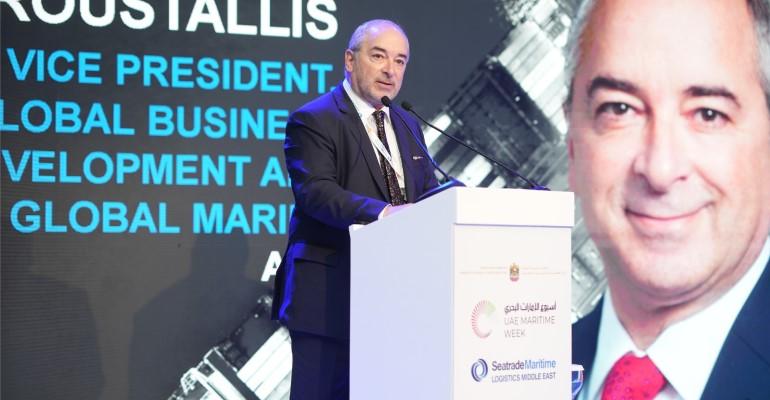Speaking at the keynote session of Seatrade Maritime Logistics Middle East (SMLME), Vassilios Kroustallis, Senior Vice President, Global Business Development and Global Marine, ABS, accepted that regulators face a challenging landscape, but stressed the need for clear guidance to the market.
At the Dubai event, Kroustallis highlighted the role the UAE will play in the decarbonisation debate this year, as the Emirate is set to host COP 28 later this year. Fellow speakers said the meeting could prove the most important COP meeting since the Paris Agreement was signed over a decade ago.
“Dubai’s hosting of COP 28 represents a golden opportunity to demonstrate how our industry is responding to the siren call for a more sustainable model and is bringing together the extensive roll call of stakeholders we need to drive genuine change,” said Kroustallis.
The International Maritime Organization’s MEPC 80 will take place in July, another critical installment of ongoing regulatory meetings, with decisions to be made on how carbon is accounted for in fuel production, and CII corrective factors.
“Let’s be clear – the challenge of CII is real and we are going to see it start to reshape the entire industry this year. The impact of CII is expected to be much greater than EEXI, as compliance will require a delicate balance of many factors. As it is based on the vessel's operation, all parties involved in the operation – owner, charterer, and port facilities - will play key roles in maintaining a vessel’s compliance,” he said.
For ports, CII will mean ship operators are on the lookout for the greenest facilities available and confidence that there will be no long delays which might harm a vessel’s CII rating. The development of shoreside power in a given region will also dictate the technologies owners will seek for their vessels, as efficient auxiliary generators become a necessity in regions lacking shoreside infrastructure.
Kroustallis was also clear on the growing regulatory burden on shipping and how a lack of a uniform approach to regulation created operational challenges, with EU ETS (Emmisions Trading Scheme) and FuelEU built on different emissions scopes, and the prospect of upcoming global regulation.
“The resulting regulatory soup creates a challenging environment in which to make high stakes decarbonisation investments,” said Kroustallis.
“We should not underestimate the importance of the regulatory landscape – it is the industry’s greatest risk as the cost of compliance hangs in the balance. We all understand the challenges regulators face but currently, everything is unsettled and the industry desperately needs consistency and clarity of outcomes,” he said.
Copyright © 2024. All rights reserved. Seatrade, a trading name of Informa Markets (UK) Limited.
Add Seatrade Maritime News to your Google News feed.  |


